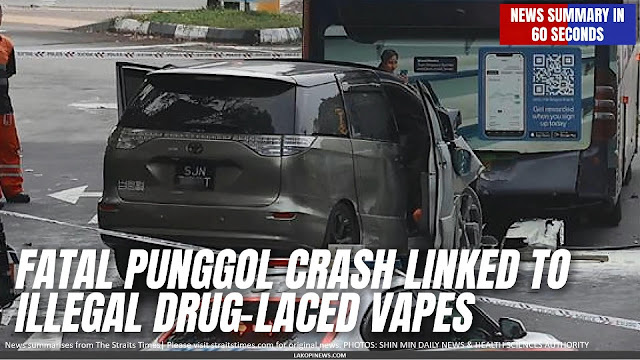On May 13, a tragic road accident occurred along Punggol Road involving a car and a bus. The aftermath has now drawn even more public attention after the Health Sciences Authority (HSA) confirmed on July 25 that etomidate, a potent anaesthetic agent never meant for recreational use was found in the blood samples of two individuals who were inside the car at the time of the crash.
According to HSA’s statement, the male driver, aged 30, was conveyed to the hospital conscious. However, his female passenger, a 28-year-old woman, was taken to the hospital unconscious and tragically died from her injuries.
Investigations following the incident uncovered a troubling discovery inside the vehicle, 42 electronic vaporisers and more than 1,200 pods. Upon testing, some of these vaping pods were found to contain etomidate. Etomidate is a controlled substance used in hospitals under strict clinical supervision, typically administered intravenously for anaesthesia. It is not approved for recreational use, especially not via inhalation.
HSA has stated that the driver is currently cooperating with the authorities in ongoing investigations, which now cover both the traffic accident and suspected violations related to possession and use of the e-vaporisers containing a dangerous substance.
The presence of etomidate in both individuals' blood raises serious concerns, especially in the context of a fatal road incident. When inhaled, etomidate can cause severe side effects including confusion, respiratory problems, seizures, and psychosis. Authorities have warned that misuse of this substance, particularly through vaping, may significantly impair one’s ability to drive or operate machinery, thus endangering lives.
This case marks a troubling escalation in the abuse of e-vaporisers in Singapore. Once marketed as trendy smoking alternatives, vapes have increasingly become conduits for delivering psychoactive substances and illicit drugs. The fact that such substances may now be contributing to road fatalities has triggered stronger responses from Singapore’s public health and safety agencies.
Just days earlier, Health Minister Ong Ye Kung announced steps to reclassify etomidate under the Misuse of Drugs Act (MDA), enabling stricter penalties for those found trafficking, consuming, or in possession of such substances. Previously only regulated under the Poisons Act which allows for a fine but not imprisonment for users, the reclassification will introduce mandatory rehabilitation for first-time abusers and jail time for repeat offenders.
This case adds real-life urgency to the legislative changes already underway. The combination of road safety, drug enforcement, and public health implications is prompting a whole-of-government response. With the number of vape-related seizures rising and with one-third of seized vapes recently found to contain etomidate, authorities are pushing for tighter regulations and more aggressive enforcement.
HSA has also reminded the public of the risks involved. Anyone found in possession of or using vapes containing such substances could face up to two years of jail and a fine of up to $10,000. Distributors, sellers, or importers may face even harsher penalties.
This tragic incident underscores the lethal consequences of drug-laced vapes. The authorities urge the public not to underestimate the dangers these devices can pose, particularly when laced with substances like etomidate.
Investigations are ongoing.

Comments
Post a Comment